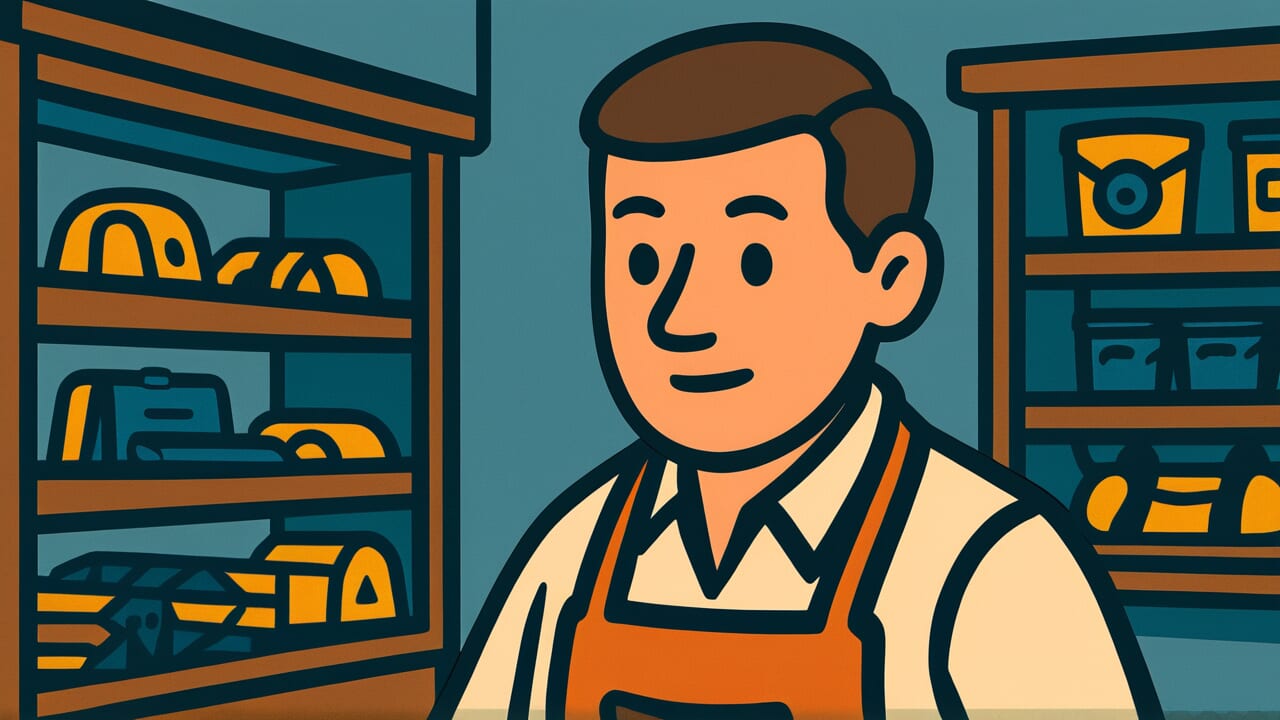How to Read “A tool shop owner with a good eye cannot make a living”
Dōguya wa me ga kiite wa shōbai ni naranu
Meaning of “A tool shop owner with a good eye cannot make a living”
This proverb expresses an ironic reality of business. Having a sharp eye for quality actually makes it harder to earn profits.
Normally, the ability to judge quality should be an important skill for merchants. But when you can accurately assess the true value of items, you can only buy them at fair prices. This means you cannot generate large profits.
This saying is used to point out how information gaps create profit opportunities in business. When sellers don’t know the true value of their goods, buyers can purchase cheaply and sell at higher prices.
It’s used with irony to show that business isn’t always about fair dealing. Even today, this concept applies to used goods trading and antique dealing. Any business where information gaps lead to profits reflects this wisdom.
Origin and Etymology
The exact literary origin of this proverb is unclear. However, it likely emerged from merchant culture during the Edo period.
A dōguya was a merchant who dealt in used tools and secondhand goods. Many such shops lined the streets of Edo.
The tool shop business relied on buying cheap and selling high. If the shop owner had a perfect eye for antiques and tools, they would only buy truly valuable items at high prices. This would reduce their profit margins.
On the other hand, a less discerning eye allowed them to find treasures from sellers who didn’t know their value. They could buy these cheaply and sell them at high prices for big profits.
This saying contains the practical wisdom of Edo merchants. It also shows their ironic view of business realities.
Honesty and integrity were considered virtues. Yet business reality didn’t always align with these ideals. This proverb expresses the complexity of human society.
It’s a realistic lesson born from everyday commerce in common people’s lives.
Usage Examples
- He was too good at judging quality, and following “A tool shop owner with a good eye cannot make a living,” he had to close his antique business
- The recycling shop manager says that according to “A tool shop owner with a good eye cannot make a living,” being somewhat rough in judgment is actually more profitable
Universal Wisdom
This proverb offers sharp insight into the relationship between information and profit in human society.
Why was this saying created and passed down through generations? Because it touches on an ironic truth of life. Knowledge and ability don’t always lead directly to happiness or success.
We’re taught that “knowledge is power.” We believe that developing expertise is the path to success.
Yet in real society, knowing too much can sometimes become a burden. Perfect judgment makes you miss hidden treasures. It makes you hesitate on bold gambles. As a result, you pass up big opportunities.
This saying reveals a reality about human society. It cannot function with perfect information symmetry.
Someone’s ignorance becomes someone else’s profit. Someone’s oversight becomes someone else’s opportunity. This may seem unfair.
But at the same time, this asymmetry creates fluidity and vitality in society.
Our ancestors looked at the gap between ideals and reality. They condensed the true nature of human society into this short phrase. It’s not pretty, but it’s honest.
Understanding the limits of perfection is also wisdom for surviving life.
When AI Hears This
When a tool shop owner becomes too skilled at judging quality, they spot every defect in the goods they consider buying. They end up purchasing only high-quality items.
Then sellers become wary. They think “this shop owner is strict” and raise prices on good items. As a result, purchasing costs rise and profits disappear.
This is a paradoxical situation. In economics, it’s called “information asymmetry.” When this asymmetry is eliminated, trading actually becomes disadvantageous.
Nobel laureate Akerlof demonstrated this with his theory of the used car market. When buyers cannot judge quality, both good and bad products trade at the same average price.
The tool shop owner maintains the position of a “buyer who cannot judge perfectly.” By purchasing at average prices, they preserve the possibility of buying good items cheaply. In other words, moderate ignorance creates profit opportunities called “hidden treasures.”
The same structure exists in modern recycling shops and flea market apps. When professional resellers become too skilled at judging, regular sellers start using specialty shops instead. Good items disappear from markets where amateurs participate.
For markets to function healthily, participants need varying levels of knowledge. When everyone becomes too smart, the market loses its appeal.
Edo merchants expressed this delicate balance through the wisdom that “one should not be too discerning.”
Lessons for Today
This proverb teaches us to understand both the value and limits of pursuing expertise. When you deepen knowledge in any field, it certainly becomes a weapon.
But at the same time, remember that knowing too much can cost you something.
In modern society, information overflows. Anyone can become an expert. But are you missing opportunities by seeking perfect information? Are you letting chance slip away while calculating every risk?
What matters is balancing knowledge with intuition. Sometimes you need courage to step forward without perfect understanding.
Sometimes you need to cloud your expert eye a bit. Look at things with a beginner’s fresh perspective.
In your life, knowledge is a tool. But don’t let that tool control you. Use it appropriately.
Aim for perfection, but remember that opportunities often hide in imperfection. That’s the practical wisdom this proverb offers to those of us living today.



Comments